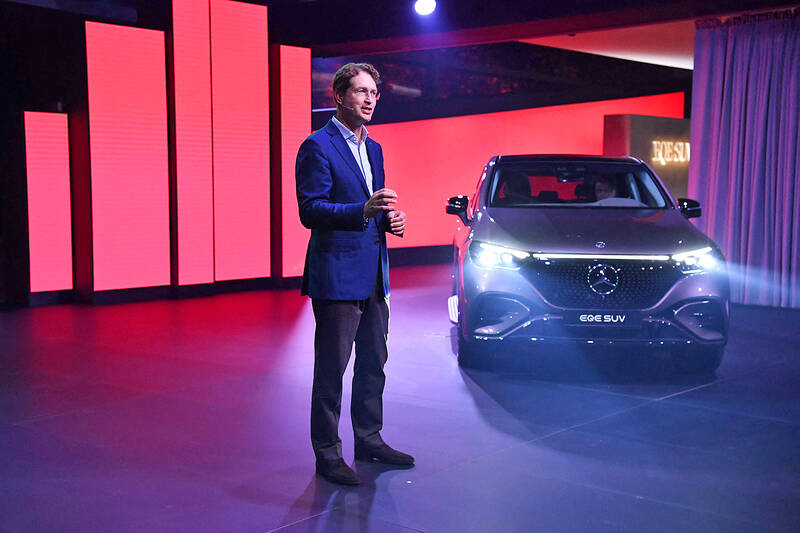Mercedes-Benz Group AG is broadening its battery-powered lineup with a sport utility vehicle (SUV) to take on Tesla Inc’s Model Y in another step toward its goal to go all-electric by the end of the decade.
The EQE SUV, unveiled on the eve of the Paris Motor Show, edges out the cheaper Model Y with 590km of driving range and is to start at about 70,000 euros (US$68,162) when sales begin late this year. It is the fourth model to use Mercedes’ dedicated electric vehicle (EV) platform, which also underpins the flagship EQS sedan.
“It’s the latest proof that we’re consistently executing on our strategy to go all-electric,” Mercedes chief executive officer Ola Kallenius said in a statement.

Photo: AFP
The SUV features a 141cm-wide screen, and the high-performance AMG version reaches a top speed of 210kph.
The automaker also announced that its vehicles would have the first non-Apple devices to offer a surround-sound system developed by Dolby Laboratories.
Mercedes plans to offer electric siblings for all combustion-engine models in its portfolio by the end of the year, then introduce three new platforms to underpin its cars, AMGs and vans by 2025. By 2030, it aims to only sell EVs in markets where phasing out engines entirely is possible.
To help fund this ambitious rollout, Mercedes plans to weed out lower-margin vehicles in favor of more profitable G-Wagon SUVs and performance models.
The EQE SUV, which is to be manufactured at Mercedes’ US plant in Alabama, debuted at the Musee Rodin in Paris ahead of a show lacking many Western automakers, including Volkswagen AG and BMW AG. Among those filing the void are Chinese manufacturers led by BYD Co (比亞迪), the country’s biggest EV maker.
China’s EV manufacturers are increasingly seeking to make inroads into Europe.
Nio Inc (蔚來汽車) this month announced plans to start sales in Germany, Denmark, Sweden and the Netherlands after modest success in Norway.
Great Wall Motor Co (長城汽車) and Seres Group Co (賽力斯集團) are also part of the Chinese contingent exhibiting at the Paris show.
After many false starts by Chinese brands over the years, the transition to EVs could pry open the door to competitive European markets. British brand MG, owned by China’s SAIC Motor Corp (上海汽車), last year sold about 40,000 vehicles in Europe.

To many, Tatu City on the outskirts of Nairobi looks like a success. The first city entirely built by a private company to be operational in east Africa, with about 25,000 people living and working there, it accounts for about two-thirds of all foreign investment in Kenya. Its low-tax status has attracted more than 100 businesses including Heineken, coffee brand Dormans, and the biggest call-center and cold-chain transport firms in the region. However, to some local politicians, Tatu City has looked more like a target for extortion. A parade of governors have demanded land worth millions of dollars in exchange

Hong Kong authorities ramped up sales of the local dollar as the greenback’s slide threatened the foreign-exchange peg. The Hong Kong Monetary Authority (HKMA) sold a record HK$60.5 billion (US$7.8 billion) of the city’s currency, according to an alert sent on its Bloomberg page yesterday in Asia, after it tested the upper end of its trading band. That added to the HK$56.1 billion of sales versus the greenback since Friday. The rapid intervention signals efforts from the city’s authorities to limit the local currency’s moves within its HK$7.75 to HK$7.85 per US dollar trading band. Heavy sales of the local dollar by

Taiwan Semiconductor Manufacturing Co’s (TSMC, 台積電) revenue jumped 48 percent last month, underscoring how electronics firms scrambled to acquire essential components before global tariffs took effect. The main chipmaker for Apple Inc and Nvidia Corp reported monthly sales of NT$349.6 billion (US$11.6 billion). That compares with the average analysts’ estimate for a 38 percent rise in second-quarter revenue. US President Donald Trump’s trade war is prompting economists to retool GDP forecasts worldwide, casting doubt over the outlook for everything from iPhone demand to computing and datacenter construction. However, TSMC — a barometer for global tech spending given its central role in the

An Indonesian animated movie is smashing regional box office records and could be set for wider success as it prepares to open beyond the Southeast Asian archipelago’s silver screens. Jumbo — a film based on the adventures of main character, Don, a large orphaned Indonesian boy facing bullying at school — last month became the highest-grossing Southeast Asian animated film, raking in more than US$8 million. Released at the end of March to coincide with the Eid holidays after the Islamic fasting month of Ramadan, the movie has hit 8 million ticket sales, the third-highest in Indonesian cinema history, Film